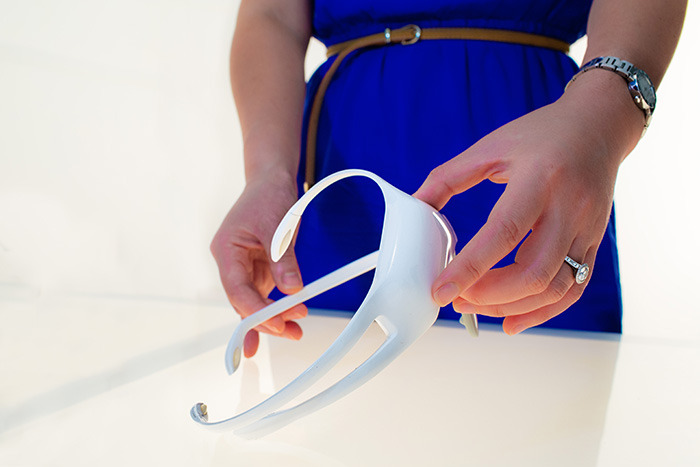 Google Glass may or may not be on its way to catching on with the consumer crowd, but, if nothing else, it shows that Google doesn't think consumers will have a problem wearing a computer on their head. As wearable health real estate goes, the head is a contentious spot for a sensor, but a number of companies are making a go for it. Brainwave sensors, like Emotiv, which has already raised $400,000 on Kickstarter, need to be on the head to function. Other sensors, like the activity-tracking swim goggles from Instabeat or the smart cycling helmet from LifeBEAM, are built into headgear that athletes are already used to wearing.
Google Glass may or may not be on its way to catching on with the consumer crowd, but, if nothing else, it shows that Google doesn't think consumers will have a problem wearing a computer on their head. As wearable health real estate goes, the head is a contentious spot for a sensor, but a number of companies are making a go for it. Brainwave sensors, like Emotiv, which has already raised $400,000 on Kickstarter, need to be on the head to function. Other sensors, like the activity-tracking swim goggles from Instabeat or the smart cycling helmet from LifeBEAM, are built into headgear that athletes are already used to wearing.
The jump in headband tracking is especially interesting in light of sleep tracking headband Zeo's failure to catch on. Successful crowdfunding campaigns prove that consumers are excited about a device that reads and responds to their brainwaves. But Zeo's story suggests that it may be harder than these companies think to translate that initial enthusiasm into sustained use and a robust market.
Nonetheless, a number of companies are making a go of it. When the dust clears from the fight for your wrist, your forehead could be the next big battleground. Here, in no particular order, are nine mobile health devices you can wear on your head.
EMOTIV INSIGHT from Emotiv

Emotiv has been on the brain tracking scene since 2003, but it's INSIGHT headband is a significant update from its first-generation Epoc device, at least in terms of design. The headset uses dry EEG sensors to detect the wearer's brain wave patterns.
"EMOTIV INSIGHT measures your brainwaves and translates it into meaningful data to help you make the most of your cognitive performance," the company writes on its Kickstarter page. "The neuroheadset can measure, track and help you improve your attention, focus, engagement, interest, excitement, affinity, relaxation and reduce stress levels."
The company says the headset can detect mental commands such as "push, pull, and rotate", and can use those commands to control remote control devices or virtual objects. The Bluetooth-connected headset has an SDK which will allow developers to program apps for computers as well as wireless devices.
Although the device could eventually be used as a mental input device, the initial use case at launch is more along the lines of a sensor for biofeedback. Early users will be able to download a free app that displays their EEG readings.
"Emotiv Insight offers you the tools you need to monitor your performance across a range of different situations and to optimize the way you go about your work and play," the Kickstarter FAQ explains. "Discover if classical music sharpens your performance, distracts you from your work or sends you to sleep. Learn how to approach business meetings to enhance your productivity. Set the thermostat so your creative juices can flow freely. Pick the best time of day for exercising, working, meditating or chilling out."
The company met its $100,000 funding goal in just over two hours on Kickstarter. (Correction: A previous version of this story said the company made its goal in two days.)

















